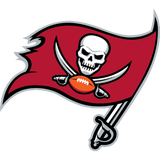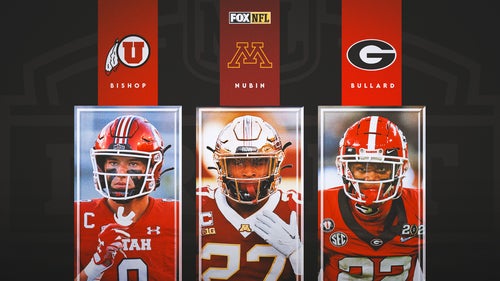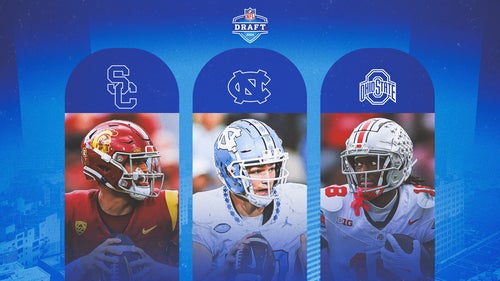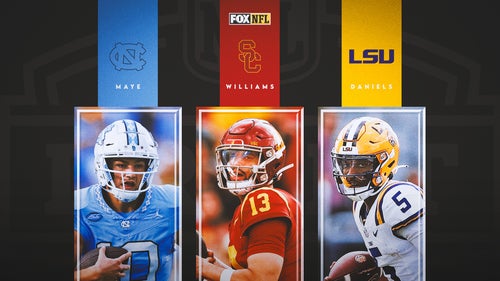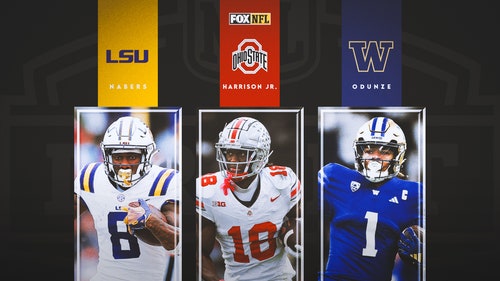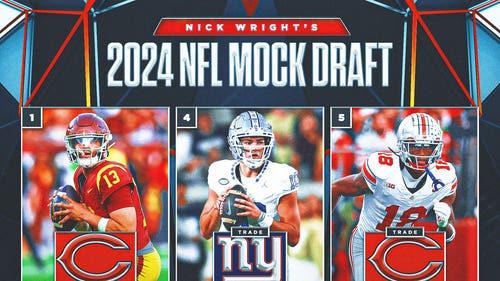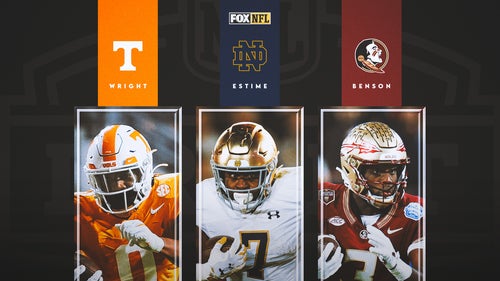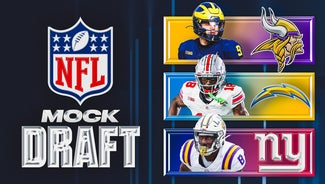
Tim Brown's plea to Raiders fans: Accept the move to Vegas
Hall of Fame receiver Tim Brown knows what it’s like to relocate with the Raiders to a new market. Brown started his career with in Los Angeles in 1988 and then packed up for Oakland six seasons later. He was the last relic of the L.A. era still playing on the team during the final season of his 15-year Raiders career. Brown calls the announcement of the team’s move to Vegas a “happy/sad” moment for the franchise. He spoke to The MMQB about the stress of relocating as a player, the team’s unique/awkward situation of remaining in Oakland for at least one more season (and possibly three), and more about the makeup of the Raiders’ roster.
KAHLER: You started your Raiders career in Los Angeles. What was it like moving from L.A. to Oakland in 1995?
BROWN: It became official around the last minicamp in June, so we didn’t have much time at all to get up to Oakland and try to find places [to live] before training camp. I think doing it that way was probably the right way for the way we left L.A. — and I really believe the way they are going to leave Oakland now is going to be the right way. This team could possibly win a championship before they leave there. That would be incredible to see that happen. I’m happy with the way things are looking at this point.
KAHLER: Was it difficult to get your stuff organized to move in such a short time?
BROWN: I was keeping my place in Manhattan Beach, I wasn’t getting rid of it. So for me, it wasn’t that big of a deal as far as things I had to move, because it was just clothes and a little bit of furniture. For other guys, who were moving everything, it was a huge deal. The team coordinated all my stuff and took care of everyone’s homes; they packed them up while we were in training camp to get it all up to Oakland. It was a crazy time, because you didn't know when you came back to your house what was going to be there. From that standpoint it was a little different and you were worrying about something you probably shouldn't be worrying about in training camp, but as I remember, things worked out pretty good.

KAHLER: Did you have a family to move at the time?
BROWN: It was just me, so I was pretty fortunate about that. I can’t imagine having a family and having to move up there, that would have been ... oh my God. I experienced it later when I had to move from Oakland to Tampa [in 2004]. The reason why I retired is because I knew I wasn’t going to play in Tampa the next year. I knew I was going to have to move again and I was like, I am not going through that again.
KAHLER: In 1995, how much did you pay attention to the news that your team might be relocating? Do players follow that type of news closely since it directly impacts their lives?
BROWN: With the Raiders during that time, it became old news because it was something they were talking about almost all the time, every year. Every offseason, there was some talk about what is going to happen with the Raiders, were they going to get a new stadium in L.A.? I was actually surprised that we moved, because since I had been in the league since ’88, every year there was some talk about moving. This sort of came out of the blue and it was a little surprising that all of a sudden we were moving up to Oakland.
KAHLER: Do you think the Raiders worked better in Oakland than they did in L.A.?
BROWN: At that time the Lakers were winning championships, the Kings were winning championships, the Dodgers won a championship. The Angels and the Clippers and ourselves, I think we were the only teams that didn’t win a championship. You were overwhelmed, especially by the Lakers because they were the NBA’s best. We certainly felt like we were the little fish in the big sea, no doubt about it, and it was just the opposite moving up to Oakland. For the most part, we became the big fish in the little sea ... you had more opportunity to do things for your community and things of that nature.
KAHLER: There has never been an NFL relocation that required the team to play in the old market for at least two seasons before moving. Usually, the relocations are for the following season. Does it seem strange to you that the Raiders will continue to play in Oakland for two and possibly three more years?
BROWN: I’m really under the impression they are going to play in Oakland this year and maybe not next year. Maybe there is a possibility that they move to the UNLV stadium. It just depends on how this year goes and whether the Raider fans accept the move, and understand that the team is moving but the heart of the team will always stay in Oakland. If they accept it that way, I think the team will make an effort to be there two years. If this is a bad year for the Raiders, as far as fan attendance and just the way the fans are accepting this, I can see the team trying their best to get out of the state for the 2018 season. It’s going to be interesting. I hope and pray that people — and I think Raider Nation, the fans that I know — are going to accept this. They won’t like it, but begrudgingly so, they are going to accept it and be able to digest it and move on with the situation and be there to support the team.
KAHLER: Do you go back to games often? Will you make sure to go next year to say goodbye to the Coliseum in case it is the last season in Oakland?
BROWN: I go to a couple home games a year, and no doubt about that, that place means an awful lot for me. I was there a couple weeks ago, and not even at the stadium, but in the hotel we stayed in the night before games. It’s just amazing the feelings that come back to you when you go back to a place like that. It was an integral part of my career, so I can’t imagine saying goodbye to the stadium, but at the same time, I believe that it is time for this organization to move up and be able to compete for free agents with the big boys. It is sort of a happy/sad situation. It is great for the organization but very sad for the fans. I get that, I understand that, but I believe Raider Nation is going to do what they do, so let’s rise up and support the team. I am looking forward to seeing that happen.
KAHLER: Will any traditions unique to Oakland be lost in the move to Vegas?
BROWN: No, I think the music and all that stuff can obviously travel. Maybe the birds in the fourth quarter of every game in November and December, you can’t take that with you. It’s something that we all anticipated and all of us knew exactly when they were going to be coming into the stadium. [In Oakland, flocks of birds often fly over the stadium at dusk. After daylight savings time, that usually takes place during the fourth quarter.] Things like that as a player that you always remember — and certainly the coolness and the weather change at that time of year, you’re going to miss that because you won't have that anymore in an indoor stadium. It’s going to be different no doubt; the atmosphere is going to be totally different. I live in Dallas and grew up as a huge Dallas Cowboys fan. I could not imagine the Cowboys playing in any stadium except Texas Stadium. Obviously that has been wiped from everyone’s memory down here because the new stadium is so fantastic and it is such a great atmosphere to be in for football. I think from that standpoint, the same will happen with the Raiders. There will be a lot of things that we will take with us, but it’s time to move on and do something new and go on to bigger and better things.
KAHLER: You were the last L.A. Raider to still be playing in Oakland by the time you left, at the end of the 2003 season. Did you tell old war stories about the L.A. days?
BROWN: Well, even when we were up in Oakland, they were still talking about us going back to L.A. What I told people, and this is coming up again with Sin City, is that L.A. is not an easy place to play football. There are so many things going on there with Hollywood and all that stuff that it becomes impossible if you don’t get off to a good start. The holiday parties in L.A. start in October and they go through January, so you’ve got parties you can be going to every night. And that was even before social media and all that stuff, so I can’t even imagine what it is going to be like now for the kids in L.A. Well, we saw what happened, they got off to a good start and what happened? They collapsed for the rest for the year, the Rams did. So, obviously, that is an issue that is on the table here for Sin City. I am hoping and praying that these guys are far enough away and the team’s facilities are far enough away that they will have to take a backpack if they are going to the Strip. They are going to be a good football team and hopefully will be even better by then and that will be enough to keep those guys from indulging in what Sin City offers.

KAHLER: As someone who played in the L.A. market, do you think two teams can coexist and thrive in Los Angeles?
BROWN: Not two bad teams, no. That’s just being honest about the situation. I know every team has the potential to turn it around overnight, but for the Chargers to agree to play in a 30,000-seat stadium, it’s really sad for San Diego. I just don’t know how many Chargers fans are going to make that short little drive up the coast to L.A. because they are so upset about the team leaving — and I know there are not a lot of Charger fans in the L.A. area. L.A. is a tough, tough market. You have a lot of stuff that you are competing against. I tell people, look, if you are 4-8 in the beginning of December, and somebody wakes up on Sunday morning and they have a sunny beach that they can go to or a football game, they are going to choose the sunny beach. They are not going to see a four-win football team when they can hang out at the beach all day. That’s the problem that you deal with. It’s not even all the other teams in L.A., it’s just you have to compete with the beach, man. It’s hard to win that battle, so it is going to be interesting to see what happens with these two teams. I think we saw last year in attendance for the Rams games, all that excitement they had at the beginning of the year was gone because they were a horrible team by the end of the year.
KAHLER: What would your advice be to the current Raiders players on how to deal with the relocation?
BROWN: It would be great if the move was happening right away, because those guys would get a 12% raise right away because of the taxes in Nevada. What I would tell them is, this is the best thing for the Raider organization. Obviously everyone wanted a [stadium] deal to happen in Oakland, including everybody that I have spoken with in the organization, but it just couldn’t happen. I would tell them to be excited, be ready to jump into a smaller community and do what you do in a very positive way. I think this could only make the legend of the Raiders lore even better.
KAHLER: The XFL held training camp in a Vegas casino for their lone season, as part of their sensational, PG-13 identity. Do you think the fact that there will now be an NFL team in Vegas changes anything about the NFL’s image?
BROWN: I think they are going to want players to stay as far away from casinos as they possibly can, but these guys are grown men, you can only suggest, you can’t bar guys from doing anything.
KAHLER: Have you been to Vegas? Do you have a favorite hotel or show or casino?
BROWN: I am going to have to refrain on that hotel question, because I am in negotiations with a couple hotels right now. I love going to Vegas. My buddies and I, we go to the shows and things of that nature, just walking around those hotels, they are so incredible. We usually go on a Friday and come back on a Sunday morning. My agent is based there, so I am there quite a bit working and doing things of that nature. I’m looking forward to it now; now I get to do all that and go to a Raiders game. It will be a great time.
KAHLER: You’ve been outspoken about suspended Raiders outside linebacker Aldon Smith needing support from his teammates. Because he is suspended, he’s not permitted to have contact with team personnel, and can’t benefit from having the team as a support system. Do you think there a better way the NFL should handle player suspensions?
BROWN: I definitely think the league should allow a couple players to reach out ... We didn’t have that rule in place back when I played. Certainly when we were in L.A., we had several guys who we had to reach out to and babysit, if you want to use that term, but it was all worth it because, yeah, we cared a lot about what they could add to the team. But we also cared more about these guys’ lives and what they were going to be able to do once they were done with football. So we reached out to guys in situations like that all time. I am still not 100% sure on that rule, because I don’t know why, if somebody is my friend, why I couldn’t call him and check on him and see what’s up. And it doesn’t have to be from an official Raider perspective. I know that the organization can’t reach out, they can’t do anything, but hopefully some of these guys are surrounding him and letting him know, that first of all, this is for your life, man. What you are doing now is fun, you are playing a game, but at some point you won’t be able to play this game, then what’s going to happen? You can only do so much in reaching out and trying to be that guy for people. At some point a man has to stand up and understand that you have to make tough decisions, and sometimes that means staying away from stuff.
KAHLER: Who were those players that you supported in the L.A. days?
BROWN: I’m not going to get into names. Hey, we were the Raiders for real back in those days. You had a lot of stuff happening all the time. Some guys you were able to save and other guys you weren’t. It was unfortunate. One guy I will mention is [former Raiders defensive tackle] Darrell Russell, because unfortunately he ended up killing himself [high-speed car crash at age 29], but there was a lot of effort put into trying to get him to understand. The problem is, when you talk to people like that, they get tears in their eyes and they shake their head, and say, 'Man I get it, I understand', and as soon as you leave them, they go right back to do doing what they are doing. That’s when you know that you have a tough situation. There were guys that you certainly were concerned about, but at the same time, you can only reach out so much. At a certain point they have to reach back.

Question? Comment? Story idea? Let us know at talkback@themmqb.com
This article originally appeared on
